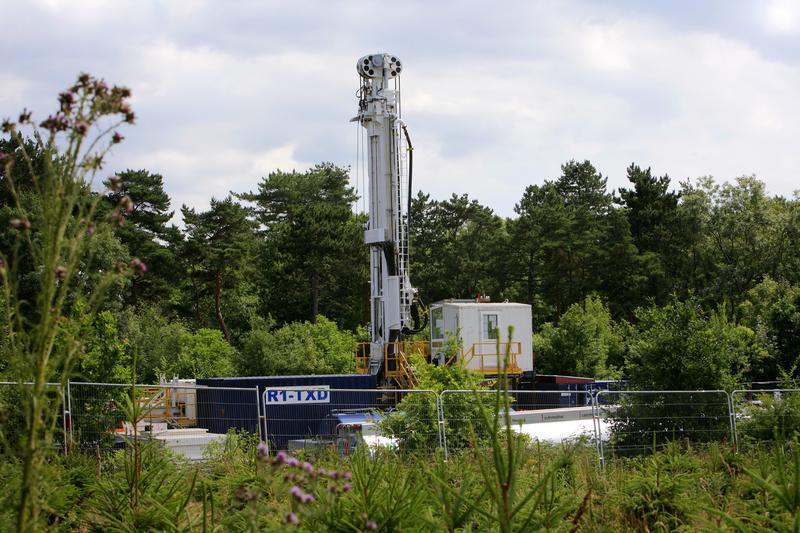Infrastructure Act: What’s going on with the 14th licensing round?

The new Infrastructure Act has put the wheels in motion for new regulations on fracking, but could this delay the announcement of the successful bidders in the government’s flagship 14th licensing round for oil and gas exploration?
The results of the 14th onshore and oil and gas licensing round – which fracking firms have bid into to gain licenses for blocks – has been expected to be announced early this year, before the General Election.
The official line from the Department of Energy and Climate Change (DECC) is – apparently – that the new law makes no difference. The regulations are about permission to drill, not licenses to explore a particular patch, they told Unearthed.
But would the fracking industry be happy to invest in licenses if some of them could be completely covered in sensitive areas that are off-limits for drilling? When we asked DECC when the blocks would be issued they were more tight lipped.
Fracking uncertainty
Here’s the problem.
An Unearthed analysis found fracking could be forbidden in 68 out of 416 new blocks if the fullest definitions of protected areas apply – though the extent of protections could depend on who is in power after the general election.
According to the law: “The Secretary of State must, by regulations made by statutory instrument, specify— (a) the descriptions of areas which are “protected groundwater source areas”, and (b)the descriptions of areas which are “other protected areas”.
The Secretary of State also needs to define what constitutes other ‘protected areas’ – including national parks, Areas of Outstanding Natural Beauty (AONBs) and Sites of Special Scientific Interest (SSSIs).
A government source said they would use narrowest possible definition of groundwater zones and may allow fracking under, but not in, national parks; whilst Labour could implement the regulation changes that got squeezed out in the Infrastructure Bill if they come into power – a far wider interpretation.
There is quite a big difference between groundwater zones 1 and 1-3 – so there could be significant uncertainties for industry if they have bid for a block that may or may not be off limits to fracking.
Regulatory confusion?
All of this may leave both regulators and industry (and energy blogs) fairly confused.
The Environment Agency (EA), which are involved in permitting fracking before it can take place, told Unearthed: “We are working with DEFRA and DECC to understand the implications of any amendments made in the Infrastructure Bill”.
The EA also need to be consulted over the fracking safeguards by the Secretary of State, according to the new law.
An EA spokesperson stressed permitting would not be delayed even if there is a transitional period between two sets of regulations – and permits would be determined according to the existing legislation until the switch at the end of the transitional period.
That said, energy and climate change minister Amber Rudd told Parliament: “I can confirm that the Government will not grant any consent for associated hydraulic fracturing operations until all the conditions are clearly defined.” Which seems a little different.
The Department for the Environment and Rural Affairs (DEFRA) declined our invitation to comment.
Election risk
So drilling may or may not be allowed in protected areas in new licenses which may, or may not, be issued before the new regulations take force.
That uncertainty means it may be politically risky for the government to announce the results of the 14th round amid public dissent over the unconventional extraction technique before the general election.
The government argues that our regulations in the UK will prevent some of the issues with fracking seen in the US – so it may prefer to award the licenses once it’s actually confirmed the regulations. They need to be drafted by 31 July, after the vote (though they could come sooner).
Investor risk
None of this means that licenses can’t be issued, indeed a DECC source indicated they may come in tranches – potentially avoiding some of the pitfalls by publishing those with less overlap with sensitive areas earliest.
When they come we can expect the names of successful applicants to be published along with the areas they are to be offered.
The latest time the announcement could come before the General Election is on 30th March, when the pre-election purdah begins.
But even once a firm has obtained a license, would they be happy about investing in developing fracking operations if they were anywhere near a sensitive area which may – later – be covered by new regulations?
We don’t know, but we hazard a guess that the fracking industry is lobbying hard behind the scenes to get more certainty on the regulations – so it knows where it can frack or not – before the successful bids are announced. Whenever that is.
Map: what may be covered by the protected areas?

